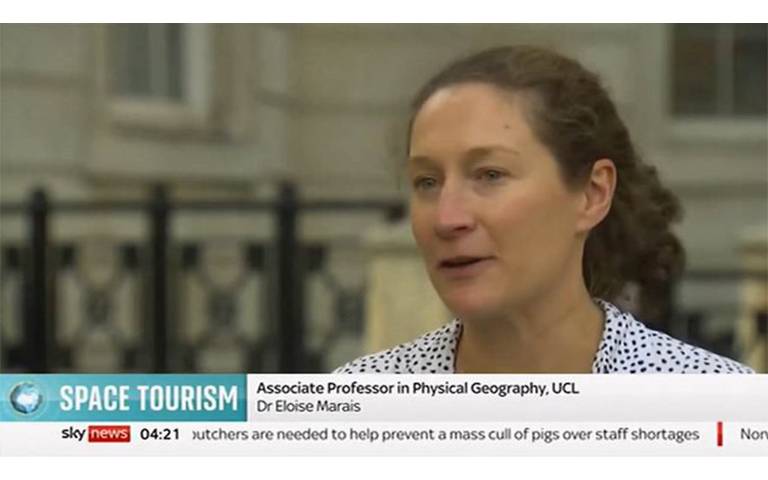Climate sacrifices undermined by space tourism, says Dr Eloise Marais
28 October 2021
UCL Geography’s Dr Eloise Marais has appeared on Sky News and Channel 4 to discuss the growing trend of space tourism and its implications for the climate.

The debate on billionaire “space tourism”, the increasingly popular industry of recreational flights into space, has seen extensive media coverage - particularly as Star Trek actor William Shatner became the oldest person to journey into space as part of Jeff Bezos’s Blue Origin project earlier this month.
Dr Marais, Associate Professor of Physical Geography, studies the impact of fossil fuels and industries on the atmosphere. She and Rob Ryan, research fellow in her group, have been running a decade-long simulation to figure out if emissions from rockets could compete with traditional sources.
She appeared on Sky News (below) on 15th October, where she said: “It undermines the sacrifices we’re trying to make on Earth to make sure we mitigate the impact that we’re having on the environment, while rich billionaires are flying out into space for very expensive selfies."
Dr Marais also appeared on Channel 4 News following tech billionaire Jared Isaacman’s four-person SpaceX flight in September, the first orbital spaceflight to consist only of private citizens.
She said: “It’s roughly 100 times more CO2 emissions per passenger from the SpaceX launch than a typical transatlantic flight.
“The biggest concern is the potential impact on the stratospheric ozone layer – there are certain pollutants that, when injected directly into that layer, can lead to ozone destruction.
“There really needs to be an international effort to develop regulation to at least mitigate the impact this nascent industry could have on the atmosphere.”
Dr Marais was invited to present her research on the environmental impact of the space tourism industry at the Harvard Atmospheric and Environmental Chemistry seminar series on 1 October.
This year, she will teach Environmental Consequences of Human Activity, a new third-year physical geography module in which students will learn about the sources and fate of environmental contaminants, the negative impacts on the environment, and approaches adopted to repair and prevent damage to the environment.
- Visit Dr Marias' Staff Profile
 Close
Close

